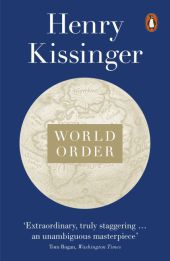 Neuerscheinungen 2014Stand: 2020-02-01 |
Schnellsuche
ISBN/Stichwort/Autor
|
Herderstraße 10
10625 Berlin
Tel.: 030 315 714 16
Fax 030 315 714 14
info@buchspektrum.de |

Henry Kissinger
World Order
Reflections on the Character of Nations and the Course of History
2014. 432 S. 198 mm
Verlag/Jahr: PENGUIN UK 2014
ISBN: 0-14-197900-3 (0141979003)
Neue ISBN: 978-0-14-197900-7 (9780141979007)
Preis und Lieferzeit: Bitte klicken
Henry Kissinger über die größte Herausforderung des 21. Jahrhunderts:
Hat das westlich geprägte Wertesystem im 21. Jahrhundert angesichts aufstrebender Mächte mit gänzlich anderem Menschenbild und Gesellschaftskonzept als Basis einer Frieden stiftenden Weltordnung ausgedient? Henry Kissinger, über Jahrzehnte zentrale Figur der US-Außenpolitik und Autorität für Fragen der internationalen Beziehungen, sieht unsere Epoche vor existenziellen Herausforderungen angesichts zunehmender Spannungen.
In der heutigen global eng vernetzten Welt wäre eine Ordnung vonnöten, die von Menschen unterschiedlicher Kultur, Geschichte und Tradition akzeptiert wird und auf einem Regelwerk beruht, das in der Lage ist, regionale wie globale Kriege einzudämmen. Der Autor analysiert die Entstehung der unterschiedlichen Ordnungssysteme etwa in China, den islamischen Ländern oder im Westen und unternimmt den Versuch, das Trennende zwischen ihnen zusammenzuführen und den Grundstein für eine zukünftige friedliche Weltordnung zu legen.
In World Order, Henry Kissinger - one of the leading practitioners of world diplomacy and author of On China - makes his monumental investigation into the ´tectonic plates´ of global history and state relations.
World Order is the summation of Henry Kissinger´s thinking about history, strategy and statecraft. As if taking a perspective from far above the globe, it examines the great tectonic plates of history and the motivations of nations, explaining the attitudes that states and empires have taken to the rest of the world from the formation of Europe to our own times.
Kissinger identifies four great ´world orders´ in history - the European, Islamic, Chinese and American. Since the end of Charlemagne´s empire, and especially since the Peace of Westphalia in 1648, Europeans have striven for balance in international affairs, first in their own continent and then globally. Islamic states have looked to their destined expansion over regions populated by unbelievers, a position exemplified today by Iran under the ayatollahs. For over 2000 years the Chinese have seen ´all under Heaven´ as being tributary to the Chinese Emperor. America views itself as a ´city on a hill´, a beacon to the world, whose values have universal validity.
How have these attitudes evolved and how have they shaped the histories of their nations, regions, and the rest of the world? What has happened when they have come into contact with each other? How have they balanced legitimacy and power at different times? What is the condition of each in our contemporary world, and how are they shaping relations between states now?
To answer these questions Henry Kissinger draws upon a lifetime´s historical study and unmatched experience as a world statesman. His account is shot through with observations about how historical change takes place, how some leaders shape their times and others fail to do so, and how far states can stray from the ideas which define them. World Order is a masterpiece of narrative, analysis and portraits of great historical actors that only Henry Kissinger could have written.


